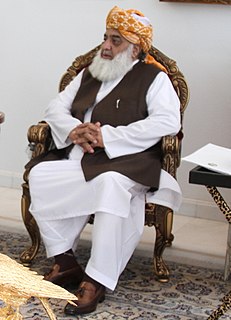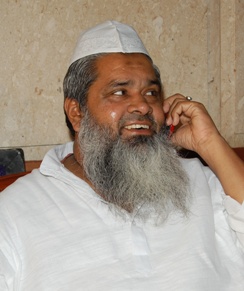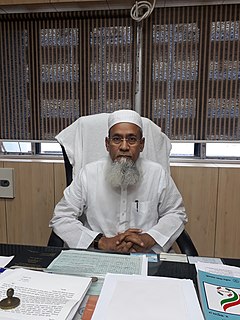Mufti Mehmood, (1919–1980) was a colonial Indian and Pakistani politician who was a member and one of the founding members of the Jamiat Ulema-e-Islam (JUI).

Fazal-ur-Rehman is a hard-line, right-wing Pakistani Deobandi politician and current president of Jamiat Ulema-e-Islam (F) (JUI-F) and Assembly of Islamic Scholars. He is also president of the Pakistan Democratic Movement (PDM), an anti-establishment coalition of political parties in Pakistan. Rehman was a member of the National Assembly between 1988 and May 2018 and previously served as Leader of the Opposition from 2004 to 2007.

Muslim nationalism in South Asia is the political and cultural expression of nationalism, founded upon the religious tenets and identity of Islam, of the Muslims of South Asia.
Shabbir Ahmad Usmani was an Islamic scholar who supported the Pakistan Movement in the 1940s. He was a religious scholar, writer, orator, politician, and expert in tafsir and Hadith.
Kishanganj Lok Sabha constituency is one of the 40 Lok Sabha (parliamentary) constituencies in Bihar state in India

Badruddin Ajmal is a member of the Indian Parliament from Dhubri Lok Sabha constituency, born in the Indian state of Assam. He has been regularly listed as among The 500 Most Influential Muslims of the world.

Jamiat Ulema-e Islam (F) (Urdu: ((جمیعت علمائے اسلام is a Sunni Deobandi political party in Pakistan. Established as the Jamiat Ulema-e Islam in 1945, it is the result of a factional split in 1988, F standing for the name of its leader, Fazal-ur-Rehman.
As’ad Madani was an Indian Deobandi Islamic scholar and a politician. He was the President of Jamiat Ulema-e-Hind religious party and a member of the executive body of Darul Uloom Deoband. He was a member of the Rajya Sabha, upper house of the Parliament of India representing Uttar Pradesh for three terms as a member of the Indian National Congress

Jamiat Ulema-e-Hind or Jamiat Ulama-I-Hind is one of the leading organizations of Islamic scholars belonging to the Deobandi school of thought in India. It was founded in 1919 by a group of Deobandi scholars. Mufti Kifayatullah Dehlavi was elected the first president of the organization, and Mohammad Sajjad as its secretary.
Arshad Madani is an Indian Muslim scholar and the current Principal of Darul Uloom Deoband. He is president of A group of the Jamiat Ulama-e-Hind since 8 February 2006.
Abul Wafa Sana'Ullah Amritsari was a British Indian, later Pakistani, Muslim scholar and a leading figure within the Ahl-e-Hadith movement who was active in the Punjab city of Amritsar. He was also a major antagonist of Mirza Ghulam Ahmad and the early Ahmadiya movement. Sanaullah Amritsari served as the general secretary of Markazi Jamiat Ahle Hadith Hind from 1906 to 1947 and was the editor of the Ahl-e-Hadees magazine. Born into a family of Kashmiri descent, he moved to Pakistan at the Partition, losing his son in the process, and himself dying in Sargodha, Punjab, Pakistan, in 1948, after suffering from a stroke.

Siddiqullah Chowdhury is an Indian politician from the state of West Bengal. He is the representative of Mangalkot constituency in the West Bengal Legislative Assembly as a member of the All India Trinamool Congress (AITC) party. He is also the president of the Jamiat Ulema-e-Hind's West Bengal branch.
Akhtarul Iman is an Indian politician from the state of Bihar. He is an elected legislator in the 17th Bihar Legislative Assembly, representing the Amour constituency. He is also the state president of All India Majlis-e-Ittehadul Muslimeen party.
The All India Azad Muslim Conference, commonly called the Azad Muslim Conference, was an organisation of nationalist Muslims in India. Its purpose was advocacy for composite nationalism and a united India, thus opposing the partition of India as well as its underlying two-nation theory put forward by the pro-separatist All India Muslim League. The conference included representatives from various political parties and organizations such as Jamiat Ulema-e-Hind, Majlis-e-Ahrar-ul-Islam, All India Momin Conference, All India Shia Political Conference, Khudai Khidmatgar, Krishak Praja Party, Anjuman-i-Watan Baluchistan, All India Muslim Majlis, and Jamiat Ahl-i-Hadis. The Canadian orientalist Wilfred Cantwell Smith felt that the attendees at the Delhi session in 1940 represented the "majority of India's Muslims". The Bombay Chronicle documented on 18 April 1946 that "The attendance at the Nationalist meeting was about five times than the attendance at the League meeting."

Nizamuddin Asir Adrawi is an Indian Sunni Muslim scholar, historian and author of Urdu. He is known for his Tarikh Jamiat Ulama Hind and biographies of Muhammad Qasim Nanautavi, Rasheed Ahmad Gangohi, Mahmud al-Hasan and Hussain Ahmad Madani.
Muhammad Miyan Deobandi (1903-1975) was an Indian Sunni Islamic scholar and Indian freedom struggle activist. He was a disciple of Hussain Ahmad Madani. He wrote historical books in Urdu.
Muhammad Salim Qasmi Siddiqi was an Indian Sunni Islamic scholar. He was the great grandson of the founder of Darul Uloom Deoband, Muhammad Qasim Nanautavi, being the eldest son of Qari Muhammad Tayyib. He co-founded Darul Uloom Waqf, Deoband along with Anzar Shah Kashmiri.

Ishaq Sambhali was an Indian politician, freedom activist, journalist and the member of parliament from Amroha parliamentary constituency of Uttar Pradesh. He was imprisoned twice during the resistance movement of India. He was associated with Communist Party of India, and served as the parliament member twice during the fourth lok sabah and fifth lok sabah elections.

Composite nationalism is a concept that argues that the Indian nation is made of up people of diverse cultures, castes, communities, and faiths. The idea teaches that "nationalism cannot be defined by religion in India." While Indian citizens maintain their distinctive religious traditions, they are members of one united Indian nation. Composite nationalism teaches that prior to the arrival of the British in India, who introduced a divide and rule policy, there was no enmity between people of different religious faiths and so these introduced divisions can be overcome.
Maulana Mohammad Sajjad was an Indian Islamic scholar who lived from 1880 - 1940 and was one of the greatest and most influential ulemas of the 20th century. Sajjad was a founder of Anjuman-Ulama-i-Bihar, Jamiat Ulema-e-Hind, and Imarat-i-Sharia. A leader in the Indian independence movement, Maulana Mohammad Sajjad participated in the Non-cooperation Movement, Khilafat Movement, and Civil Disobedience Movement; he opposed the partition of India and championed the concept of composite nationalism. He also founded the Muslim Independent Party in 1935 to represent Muslims in Bihar who were disillusioned with Congress and the Muslim League.The Muslim Independent Party formed the government in Bihar in 1937. Yunus, the party president, became the chief minister of Bihar on 1 April 1937.ref name="Sajjad2018">Sajjad, Mohammad. "The real culprits behind India's Partition". Rediff. Retrieved 30 October 2020.</ref>







